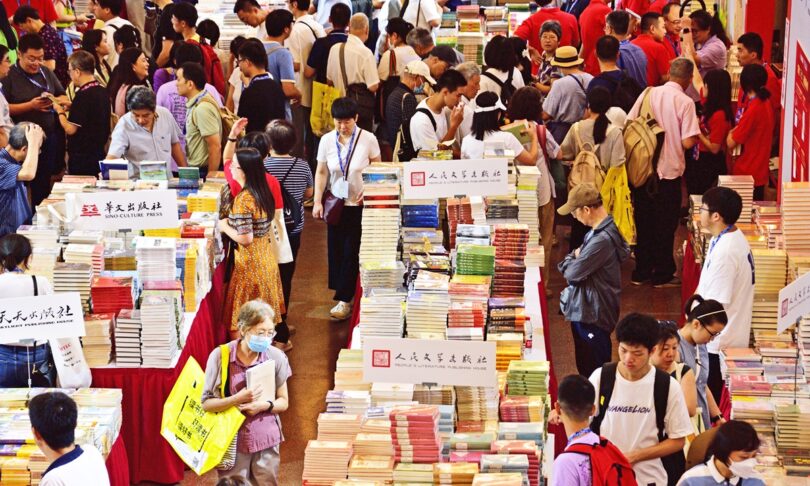BEIJING : Queuing outside the Shanghai Exhibition Center at 9:30 in the morning, Zhang Sijing, a book lover and mother of two, told the Global Times that her family had “already arrived late” to attend the 2023 Shanghai Book Fair (SBF) even though it only opened half an hour before they had arrived.
Hosting a total of 850 reading events in a six-day schedule, the 2023 SBF is Shanghai’s stellar book gala of the year.
The main venue is sectioned into eight areas. The China Publishing Group Corporation is a highlight of the fair.
This parent exhibitor has brought 23 subsidiaries including the People’s Literature Publishing House, China’s national-level publishing institution of literature, to the event.
More than 5,000 kinds of books and nearly 40,000 copies are on display at the exhibitor’s booth, which seeks to cater to a variety of tastes.
As a melting pot of reading resources from all around the country, the 2023 SBF features not only local exhibitors like the Shanghai Old Bookstore, but also more than 20 key national publishing groups like the Phoenix Publishing & Media Group from Jiangsu Province and the Sichuan Xinhua Publishing Group.
The Shanghai Old Bookstore under the Shanghai Century Publishing Group has brought more than 10,000 types of old and limited print books this time.
“I bought around 10 old books for about 1,000 yuan ($137). Some of them are limited editions books about Dream of the Red Chamber and about the history of Shanghai. These books are hard to find in the market, so I came to the book fair on the first day to hunt for these old books,” a book lover surnamed Cui told the Global Times.
Cultural expert Xu Shuming told the Global Times that a cultural fair like this is a “sharing platform co-built by different resources, so some very unique local cultures can contribute to its diversity.”
The province of Sichuan is the guest of honor of the 2023 SBF. It has brought more than 3,000 kinds of books to the fair, many of which explain the charm of Shu culture, the ancient culture of Sichuan, through places like the Sanxingdui Ruins site and the life of Su Shi, the great literati in the Northern Song Dynasty (960-1127).
“One district, one show” is the 2023 SBF special installment that aims to better promoting reading among the public. Cultural events such as “International Literature Week” and the “Chen Bochui International Children’s Literature Award” will be carried out at separate venues scattered around Shanghai’s 16 districts.
A booth dedicated to Chinese writer Chen Bochui has made a reappearance at the 2023 SBF after two years and now offers multimedia and AI interactive experiences.
“Our booth is buzzing with parents eagerly bringing their kids to the book fair. It shows that reading is still highly encouraged and the passion for books is very much alive,” a staffer surnamed Yang told the Global Times.
At the foyer of the fair’s exhibition area, multiple case studies relating to China’s digital integrated publications have been choreographed into a show depicting the creative transformation of the physical book industry.
Fang Jiaxun, a publishing industry insider, told the Global Times that digital transformation has become even more “urgent” for the paper-back book industry. It can increase “book’s cultural impact,” while helping the industry avoid unexpected harm like the recent floods in northern China.
Other than the digital section, the 2023 SBF is carrying out both online and offline events with a majority of publishers having livestreaming booths. A representative of the Beijing Publishing Group told the Global Times that livestreaming has become a “standard” for book fairs.
Although e-books have had a certain impact on physical books, there are still many people like Cui who enjoy the experience of browsing and discovering books offline.
“I think there is a difference between browsing a book fair and buying books online, as most of it is done online nowadays. The offline book fairs are more concentrated, and you can directly browse through the content and catalog of the books. It’s a joyful experience to discover books unexpectedly,” Cui said.
A frequent visitor to the SBF, Cui said she is excited that the event has fully returned to offline after the ease of the pandemic.
“There are more events like book sharing and book signings… There is a lot of integration and interaction between online and offline platforms. For example, some visitors are attracted by social media and then come to the offline event. These diverse forms of interaction can engage with younger readers and attract readers of all ages to participate in reading,” Cui said.
Courtesy: globaltimes







